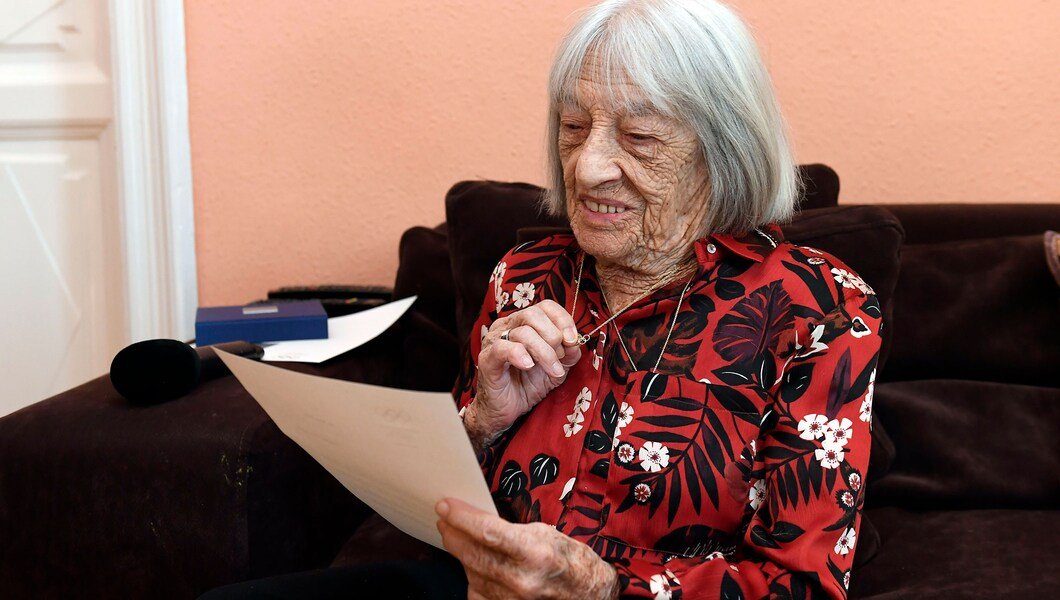The remarkable Hungarian former gymnast, who survived the Nazis and went on to win 10 Olympic medals, 5 of them gold, turns 100 today.
The oldest surviving Olympic champion, Ágnes Keleti, celebrates her 100th birthday this Saturday. Ms Keleti is one of her country’s most successful Olympians, having won 10 medals for Hungary in gymnastics, at the Olympic Games Helsinki 1952 and Melbourne 1956. Her haul included five golds.
She won the floor event in Finland before producing an astonishing display in Australia, winning four golds – in the uneven bars, balance beam, floor, and team event. At 35, she became the oldest female gymnast to win an Olympic title.
Amongst today’s congratulators was the President of the International Olympic Committee, Thomas Bach, who called Ms Keleti on her birthday: “Heartfelt congratulations and best wishes for your birthday. Your story is truly inspirational,” he said to her. “You have demonstrated the power of strong determination and courage to overcome tragedy. These are the attributes of a great Olympic champion. As an Olympian, your 10 medals, five of them gold, are truly amazing. I am sure that had you competed at the Olympic Games London 1948, you might even have had more.” The President of the Hungarian Olympic Committee, Krisztian Kulcsar, handed over a present on behalf of the IOC President.
Ms Keleti, born Agnes Klein, is Hungary’s most-decorated female Olympian – and only three legendary male fencers (Aladár Gerevich, Pál Kovács and Rudolf Kárpáti) have won more Olympic gold medals for the country.
She might perhaps have claimed more herself, too, had World War II not intervened. Ms Keleti did not get the chance to compete at the Olympic Games until she was 31 – long past the prime of many gymnasts.
Ms Keleti had taken up the sport at the age of four and joined the VAC Sports Club, the only Jewish club in Budapest. At 16, she had won her first national title (she would go on to add nine more). Ms Keleti looked a sure bet to be in the Hungarian team for the 1940 Olympic Games, which were due to be held in Tokyo.
Conflict ended those chances, and any prospects for 1944, too, while in 1948, she served as an alternate.
The War had brought much more serious problems, however. In 1941, with Hungary fighting alongside Germany and Italy as part of the Axis powers, Ms Keleti was expelled from her gymnastics club for being Jewish and forced to go into hiding with her family in the countryside.
She survived after assuming a false identity and working as a maid. As the Nazis occupied Hungary, she later married fellow gymnast István Sárkány, believing that it would make her less likely to be sent to a labour camp.
A combination of bravery, resourcefulness and luck helped Ms Keleti survive. Her family also sought refuge in a “Swedish House” administered by Raoul Wallenberg, who was later recognised for his role in helping Jews to escape the concentration camps. Her father and uncles were not so lucky: they were among the 550,000 Hungarian Jews killed at Auschwitz and other camps.
After the War, Ms Keleti found employment as a fur worker and a demonstrator at the Faculty of Gymnastics at the Budapest School for Physical Culture. She was also an accomplished cellist and played professionally. By 1947, she had won her first Central European Gymnastics Championship, and sporting excellence clearly beckoned.
The World Gymnastics Championships of 1954 indicated her steady improvement – she won gold in the uneven bars – but Melbourne would be her high point. She took four golds in fine style, and only a poor performance on the horse vault prevented her winning the all-around individual gold. The USSR’s Larisa Latynina beat her to that title.
After Melbourne 1956, Ms Keleti remained in Australia, receiving political asylum: the Soviet Union had invaded Hungary during the event. She eventually emigrated to Israel, where she remarried and had two children (she and Sárkány had divorced). She taught physical education at the Orde Wingate Institute, and later became Israel’s women’s gymnastics coach.
Ms Keleti was inducted into the International Gymnastics Hall of Fame in 2002 and was awarded the Israel Prize in 2017 for her contribution to the sport in her adopted country. She is the most successful female Jewish athlete in Olympic history, with only one Jewish athlete – swimmer Mark Spitz – having won more Olympic medals.



